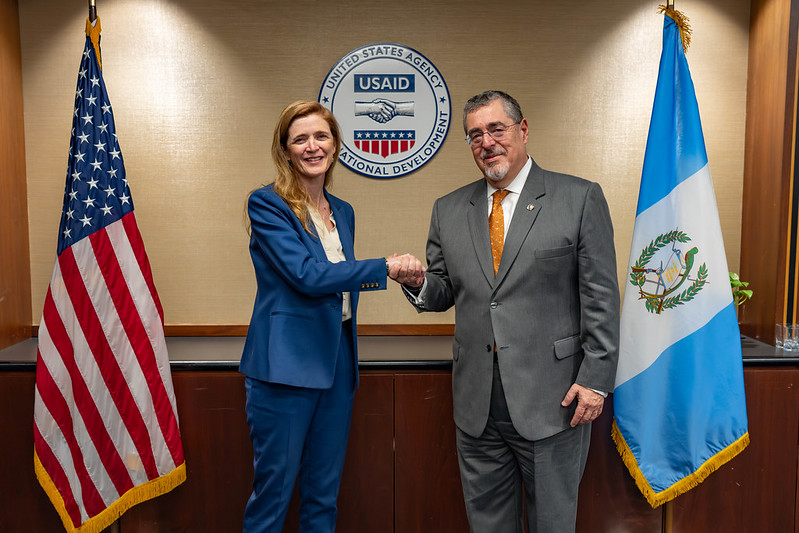USAID Programs in Guatemala
 Despite being the largest economy in Central America, Guatemala has the highest poverty and inequality rates in Latin America and the Caribbean. As of 2023, an estimated 55.1% of the population is affected by poverty, with a child malnutrition rate of 47%, among the 10th highest in the world. However, the United States Agency for International Development (USAID), a nongovernmental organization (NGO), has been running programs to alleviate poverty in Guatemala since the ’80s. The programs aim “to address the drivers of irregular migration to the United States, including high levels of violence and insecurity, pervasive poverty and chronic malnutrition.”
Despite being the largest economy in Central America, Guatemala has the highest poverty and inequality rates in Latin America and the Caribbean. As of 2023, an estimated 55.1% of the population is affected by poverty, with a child malnutrition rate of 47%, among the 10th highest in the world. However, the United States Agency for International Development (USAID), a nongovernmental organization (NGO), has been running programs to alleviate poverty in Guatemala since the ’80s. The programs aim “to address the drivers of irregular migration to the United States, including high levels of violence and insecurity, pervasive poverty and chronic malnutrition.”
Factors Affecting Poverty in Guatemala
Hurricanes Eta and Iota in 2020 severely damaged infrastructure, leading to losses of 0.56% of gross domestic product (GDP) and 0.20% GDP of agriculture-related losses. The COVID-19 pandemic further disrupted Guatemala’s economy by straining the health care system, disrupting education due to lockdowns and increasing food insecurity by disrupting food supply chains, leading to greater malnutrition and loss of livelihoods.
On February 2, 2021, President Biden Signed an Executive Order calling for Addressing the Root Causes of Migration in Central America. The order intends to work alongside USAID to implement programs to alleviate poverty in Guatemala, hoping that, as a result, it will also reduce migration to the United States (U.S.).
The Root Cause Strategy in Guatemala
Vice President Kamala Harris met with Guatemalan President Bernardo Arévalo on March 25, 2024, to encourage bilateral relations as part of the Biden Administration’s ongoing commitment. She announced the planned investment of $135 million in USAID alongside $170 million intended to aid development, economic health and security assistance for Guatemala.
USAID Programs Involvement in the Root Cause Strategy
The funding provided by the Biden Administration is planned to implement the following USAID Programs in Guatemala:
- Anti-corruption Task Force: Guatemala has long been riddled with corruption among governing and police officials, ranking 13 out of 15 Latin American countries in its ability to detect, punish and prevent corruption. The USAID task force aims to build public trust in democracy as a system that works in its interest by implementing U.S. law enforcement officials and prosecutors to work on and investigate corruption cases.
- Central American Service Corps (CASC): The program was announced in 2022 and, after a successful run, is set to expand in May, funded by USAID. In the next five years, it aims to reach 25,000 Guatemalan youth at risk of migrating by engaging them in volunteer work, training and employment opportunities in Guatemala.
- Feed the Future Programme: USAID intends to support research capacity, education and advice on “Climate Smart” agriculture and build opportunities to scale agricultural technologies. In turn, it will bolster food security, which affects 4.6 million Guatemalans and aid economic development by fostering rural entrepreneurship.
- Guatemala Biodiversity Conservation: USAID will implement this program to strengthen the Guatemalan System of Protected Areas, focusing on the Maya Biosphere Reserve, Sierra de las Minas Biosphere Reserve and areas of ecological importance along the Pacific Coast. Conservation efforts often create opportunities for ecotourism, allowing Guatemala to create job sectors to generate ecotourism activities.
- Boosting Education: Due to a lack of funding and inefficient education systems, approximately 3% of Guatemala’s GDP is spent on education. Therefore, USAID intends to support the Government of Guatemala in establishing an educational foundation for children and youth to provide an alternative to migration. It has already reached nearly 69,000 learners in high-out-migration municipalities.
Looking to the Future
The Root Cause Strategy’s efforts to increase USAID funding and implement new programs in Guatemala offer a hopeful future. With consistent support, USAID can continue to alleviate poverty by boosting the agricultural economy, combat malnutrition by enhancing food security and address educational deficits with increased funding.
– Fatima Naqavi
Fatima is based in London, UK and focuses on Good News for The Borgen Project.
Photo: Flickr
